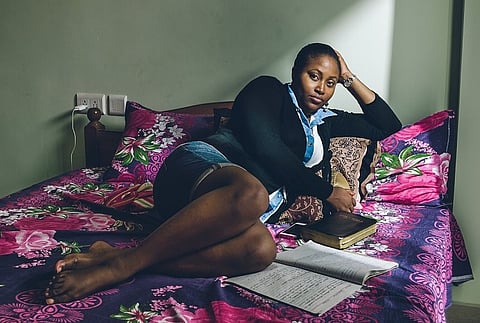

Mahesh Shantaram thinks it’s about time we Indians have an honest conversation with and about the African men and women who live among us. That in 2016, the question of race has finally become a talking point, with reams of news articles, analyses and debates in the last few months, gives him hope.
Mahesh’s own contribution to that conversation, comes in the form of a series of personal portraits of Africans living in Bengaluru, Delhi, Manipal, Jaipur and Hyderabad – a project that he kicked off following the horrific mob attack on a Tanzanian woman in Bengaluru in February. “There are some incidents that go beyond the isolated viewpoint of a crime, and garner international attention,” he says. He points to what the December 16 rape case in Delhi did to the conversation on women’s safety, and observes that the attack on the Tanzanian woman similarly shifted the debate on race.
But why personal portraiture? After all, isn’t racism a question of our gaze and thinking than that of the African subjects Mahesh photographs? Personal portraiture is a way of humanising the subject and establishing their visual identity, says Mahesh, pointing out that compared to the numbers of Africans who live in Indian cities, their public visibility is very low. “Just realising that so many of them live in our city, and we share our city and its woes with them, means that we need to see them.”
When we see them for who they are, he says, “you feel like these people are just like us. They have ambitions, they have aspirations, they come here to study, they want to finish their course, go back to their country and help build it. So they want the same things in life as we do.”
That’s also why Mahesh chose portraiture as a mode of subjective documentary – because it opens up worlds and lives for interpretation instead of just documenting factual events. Together with the stories of his subjects that he documents on thecontrarian.in/racism, the portraits contextualise and flesh out lives that we otherwise rarely notice. “When you read the stories you will see the context in which these pictures were made. I am not exoticising them, I am asking you to recognise them.”
What’s most fascinating and absorbing about Mahesh’s series of photographs is that not one of his subjects sport a smile. The intensity of their expressions, which draw the viewer in and arrest the wandering gaze, says Mahesh, is the result of the long exposure photography he relies on. “This goes back to the portraiture methods of the 1800s, where it would take a very long time for the picture to form on the glass plate. That’s why the portraiture of those days was very stiff. But it also was very descriptive,” he explains.
He sees such photography as a counter to the “selfie plague”, which he finds “stupid”.
“I want to know where they come from, what they have left behind. Like some people may be from royal families, or may have sold their land to fund their education. Just imagine selling your land, raising the funds to pay for your education, and then getting beaten up and killed and going back in a coffin. That’s the ultimate nightmare of the people back home.”
The exhibition of his portraits, he feels, could open up new avenues in which this conversation could go further. “When do Indians and Africans usually meet? Only when an incident occurs. And then only in spaces of hostility – police stations, TV studios where debates take place, or bureaucratic offices. Here in a space of art and culture, where people are open for discussion, maybe we could initiate a conversation.”
So along with the exhibitions of the photographs in five cities by Tasveer – Bengaluru, Gandhinagar, Mumbai, Delhi, and Kolkata – there are also discussions and conversations as happened at the Max Mueller Bhavan in Bengaluru on Saturday, through which Mahesh hopes to bring Indian and African voices into dialogue.
Mahesh Shantaram’s photographs are on exhibition at the Tasveer Gallery on Kasturba Cross Road in Bengaluru till September 23.